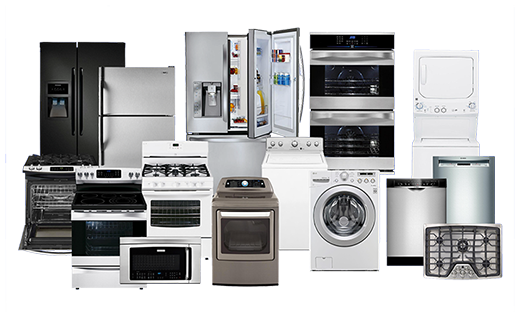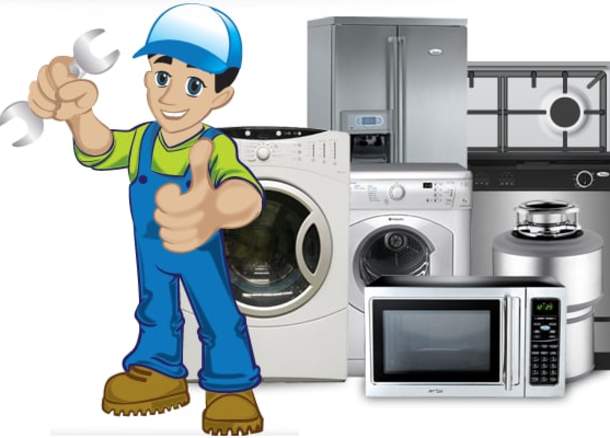The Ultimate Overview to Comprehending Home Appliance Repair Work in the house
When your refrigerator stops cooling or your oven rejects to warm, it can feel frustrating. Recognizing home appliance repair at home can save you time and cash. You'll find out to identify signs, use vital devices, and follow a systematic troubleshooting process. However prior to you begin, there are important safety and security preventative measures you need to take into consideration. What are one of the most usual troubles, and exactly how can you fix them? Let's explore the essentials.
Common Device Troubles and Their Signs and symptoms
When your home appliances start acting up, it's crucial to recognize the indications early. Neglecting them can result in larger issues and costly repair work. For example, if your fridge isn't cooling correctly, you could see warm spots or condensation forming. This can suggest a stopping working compressor or a blocked vent.Your dish washer may reveal issues through dirty dishes or unusual sounds during cycles. If you hear grinding or clanking, it's time to investigate.A washing maker that will not rotate or drain can leave you with soggy laundry, suggesting a clogged drain or a malfunctioning pump.Lastly, if your stove's temperature level seems off or it takes for life to preheat, you might be managing a defective thermostat. By staying sharp to these signs, you can address issues prior to they rise into significant repair work.
Necessary Tools for Home Appliance Repair
When you're tackling appliance fixings in the house, having the right tools is important. Basic hand tools like screwdrivers and pliers will help you take apart and fix different appliances, while electric screening tools guarantee you're functioning securely with circuitry. Let's review what you need to begin on your repair journey.
Basic Hand Tools
Having the right devices is important for effective appliance repair in the house. Start with a reputable screwdriver collection, consisting of both flathead and Phillips kinds, as screws prevail in appliance setting up. Pliers are additionally essential; they aid with gripping, turning, and cutting wires or little components. A set of needle-nose pliers can reach difficult situations easily. You'll require a good adjustable wrench for tightening up or loosening nuts and screws. An energy blade comes in handy for cutting with packaging or insulation. Lastly, do not forget a tough workbench or surface to safely organize your devices and parts. With these basic hand devices, you'll be well-prepared to deal with most device repairs that come your means.
Electrical Testing Gadgets
Together with standard hand tools, electrical screening tools play a crucial function in home appliance repair work. These devices aid you identify electric problems and warranty home appliances operate securely. A multimeter is important; it determines voltage, existing, and resistance, enabling you to pinpoint issues promptly. A non-contact voltage tester is one more essential, letting you identify real-time cables without making straight contact, improving your safety and security. Secure meters are excellent for gauging current circulation in cords without disconnecting them, saving you effort and time. Additionally, circuit testers can swiftly inspect if electrical outlets are functioning appropriately. By using these gadgets, you'll simplify your troubleshooting process and enhance your repair work skills, making appliance upkeep a whole lot less complicated.
Step-by-Step Guide to Diagnosing Home Appliance Issues
When your home appliance acts up, it can be irritating, but identifying the issue doesn't have to be frustrating. You'll find out to recognize usual troubles and use reliable fixing strategies. Allow's go through the actions to obtain your appliance back in working order.
Common Appliance Issues

Troubleshooting Methods Described

Repairing Significant Cooking Area Home Appliances: A Closer Look
Have you ever before asked yourself exactly how to tackle typical issues with your kitchen home appliances? Fixing major kitchen area devices like fridges, stoves, and dish washers can be simpler than you think. Start by identifying the issue-- whether it's a fridge not cooling down or an oven that won't heat up. Typically, a straightforward reset or checking the source of power can resolve the issue.For fridges, tidy the condenser coils and check the door seals. If your stove's not home heating, inspect the heating element and thermostat. Dishwashers could simply require a clean filter or a reset to get them back at work. Constantly unplug the appliance prior to diving right into fixings to assure your safety.Don' t fail to remember to consult the customer handbook for certain fixing suggestions connected to your design. With a little bit of perseverance and the right devices, you can with confidence take on device repair work and save money while doing so!

Fixing Laundry Appliances: Tips and Techniques
When your laundry home appliances begin breaking click here down, it can feel overwhelming, however troubleshooting them does not have to be a hassle. Beginning by examining the power supply. Confirm the home appliance is connected in and the electrical outlet is working. Next off, examine the door or cover switch; a malfunctioning button can stop the equipment from operating.For washing machines, if it's not spinning, look for out of balance lots. Redistributing the clothing could fix the problem. If your clothes dryer isn't home heating, tidy the lint filter and examine the vent for blockages.Listen for uncommon sounds; they can indicate a trouble. If your device is dripping, examine the hoses for cracks or loosened connections. Record any kind of mistake codes presented on electronic screens, as they can guide you in identifying the concern. Finally, seek advice from the user manual for details repairing pointers connected to your version.
Security Precautions to Take Throughout Services
Prior to you begin any type of device repair work, it's necessary to focus on security to avoid accidents or injuries. Unplug the device or turn off the circuit breaker to guarantee no power reaches it while you work. Usage shielded tools to decrease the danger of electric shock. Wear safety and security goggles and gloves to secure yourself from sharp sides or debris (Maytag Washing machine repair Dependable Refrigeration & Appliance Repair Service).Make specific your workspace is neat and well-lit, so you can see what you're doing. Maintain kids and animals far from the location to prevent distractions and potential threats. If you're managing gas devices, be additional cautious; check for leakages before proceeding.Take your time, and don't rush via repair services. If you really feel uncertain about any type of step, it's far better to stop and study than to guess. Following these safety measures will assist produce a much safer atmosphere for your DIY home appliance repair work task
When to Call a Specialist for Aid
Just how do you recognize if it's time to call in a professional for home appliance repairs? If you've tried basic troubleshooting without success, it's a clear indicator. If your device still will not start or shows uncommon sounds after resetting it, do not think twice to look for specialist help.When you observe leaks, smoke, or melting smells, focus on safety and security and call a professional right away. These issues can cause even more considerable damages or position dangers to your home.Also, if your home appliance is under guarantee, getting in touch with a specialist is usually the most effective path. They can ensure that repairs won't void your service warranty, conserving you cash in the long run.Finally, if you're not sure or uncomfortable with intricate repair services, it's important to leave it to the professionals. Bear in mind, taking on complicated problems without the right knowledge can lead to costly blunders. Trust a specialist when in doubt!
Often Asked Concerns
How Can I Protect Against Home Appliance Troubles in the Future?
To protect against home appliance troubles in the future, you ought to do normal maintenance, check for wear and tear, tidy filters, and prevent overloading. Staying positive will certainly aid extend their lifespan and maintain them running efficiently.
What Are one of the most Typical Do It Yourself Appliance Fixing Mistakes?
You might forget safety and security precautions, miss troubleshooting actions, or utilize wrong tools when trying DIY appliance repair work. Rushing the procedure or neglecting manufacturer standards can cause even more considerable problems and expensive errors. Remain client and informed!
How Do I Know if a Part Needs Replacement?
You can tell if a component requires replacement by looking for unusual noises, leaks, or irregular performance. If the home appliance has a hard time to run appropriately or reveals noticeable damages, it's most likely time for a replacement.
Can I Make Use Of Generic Parts for Appliance Fixes?
Yes, you can make use of generic parts for appliance repair services, yet establish they work - Dependable Refrigeration & Appliance Repair Service Washer repair near me. Common components might conserve you cash, but they could affect efficiency or longevity, so weigh your alternatives thoroughly prior to deciding
What Guarantees Cover Appliance Services?
The majority of appliance warranties cover fixings for manufacturing issues, yet they frequently omit damage from abuse. Inspect your service warranty terms thoroughly, as some might call for using licensed professionals and original parts for coverage to remain legitimate.